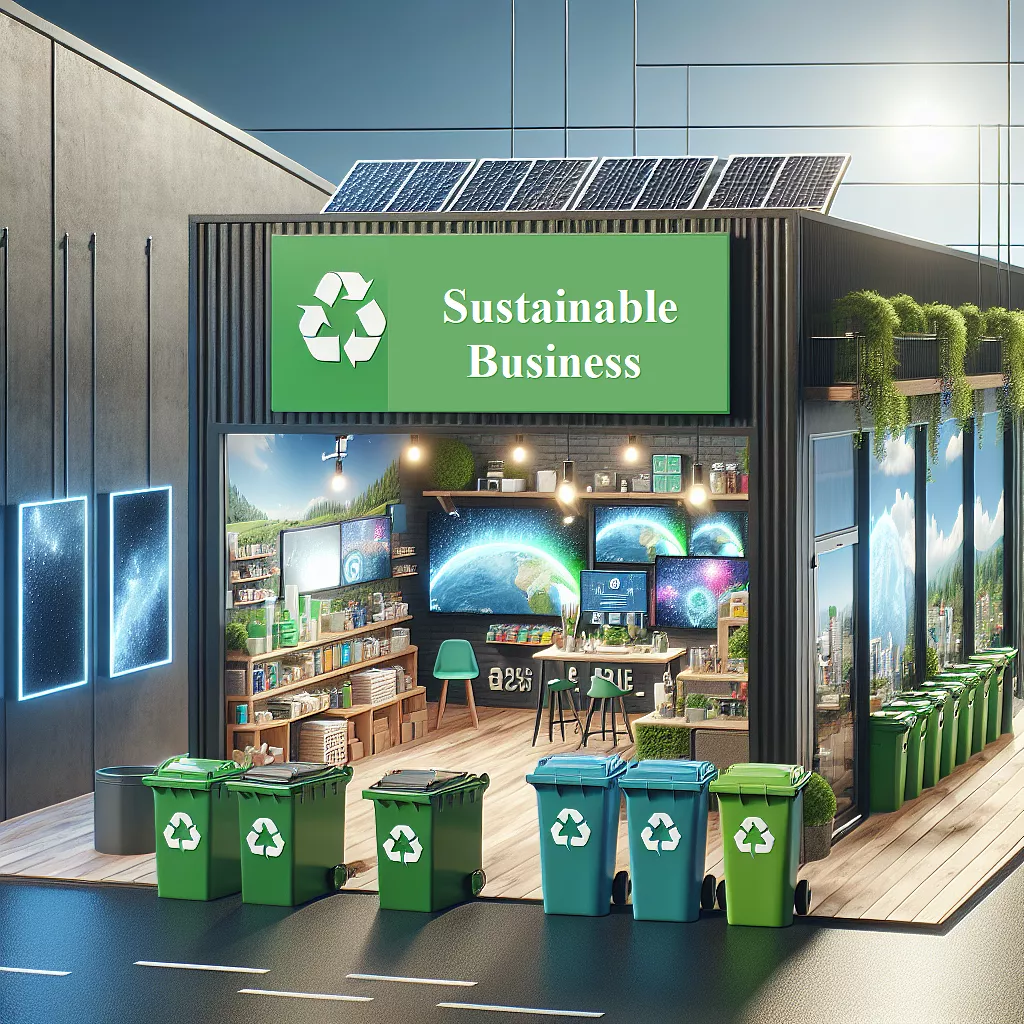As our planet grapples with environmental challenges, businesses are uniquely positioned to drive change. “Sustainable Marketing Strategies & Practices for Businesses” delves into how companies can align their operations with sustainable principles, fostering a positive impact on both the environment and their bottom line. This article explores sustainable marketing strategies, from harnessing renewable energy sources to developing eco-friendly products, demonstrating how businesses can thrive while contributing to a healthier planet. Embrace a new perspective on Sustainable Marketing Strategies – one that champions sustainability for a brighter tomorrow.
Table of Contents
Key Takeaways and Action Points
When you’re about to start a small business, the volume of information can be daunting. We’ve simplified it for you – This section a quick snapshot of the main points of this article. Each point is designed to guide you towards a successful business launch. Along with each point, there’s a practical step you can take for successful growth.
| Key Takeaways | Action Points |
|---|---|
| 1. Sustainable marketing involves integrating social, economic, and environmental factors. | Develop a marketing strategy that incorporates these three aspects. |
| 2. Sustainable marketing requires a holistic approach. | Ensure your marketing strategy addresses social and environmental issues while delivering customer value. |
| 3. Sustainable Marketing Strategies can help the environment and build customer loyalty. | Consider sponsoring local events or adopting green business practices. |
| 4. Sustainable marketing is valuable for small businesses looking to differentiate themselves. | Use sustainable marketing to highlight your unique selling points. |
| 5. An effective local green marketing campaign can provide an authentic sustainable solution. | Develop a local green marketing campaign that demonstrates your commitment to environmental and social responsibility. |
| 6. Sustainable marketing requires a focus on sustainability in all aspects of your business. | Review all business operations to ensure they align with sustainability principles. |
| 7. Businesses can enhance their digital marketing strategy by demonstrating their commitment to building a sustainable business. | Highlight your sustainable practices in your digital marketing campaigns. |
| 8. Sustainable marketing is more than a trend; it’s an essential part of doing business today. | Prioritize sustainable practices in your marketing efforts. |
| 9. Sustainable marketing can create real value for your customers and your business. | Communicate the benefits of your sustainable practices to your customers. |
| 10. The global business landscape is becoming increasingly conscious of environmental and social issues. | Stay informed about current trends and adapt your marketing strategy accordingly. |
| 11. The approach to sustainable marketing has seen a significant shift. | Continually review and update your marketing strategy to align with current sustainable marketing trends. |
| 12. Sustainable marketing strategies and practices are evolving. | Stay ahead of the curve by continually learning and implementing new sustainable marketing practices. |
Introduction to Sustainability Marketing Strategies & Practices
Sustainable marketing practices involve integrating social, economic, and environmental factors into your marketing strategy. By adopting sustainable practices, businesses can demonstrate their commitment to social responsibility and contribute to a more sustainable future.
Sustainable marketing involves a holistic approach, focusing on addressing social and environmental issues while delivering customer value. By adopting sustainable marketing strategies and integrating them into your marketing campaign, you can appeal to conscious consumers, enhance your brand reputation, and ensure environmentally and socially responsible practices.
Sustainable Marketing Strategies, like sponsoring local events or adopting green business practices, are examples of sustainable marketing that can help the environment and build customer loyalty. This type of marketing is especially valuable for small businesses looking to differentiate themselves in the market.
An effective local green marketing campaign can provide an authentic sustainable solution, demonstrating your business’s commitment to environmental and social responsibility. So, whether you’re a marketing team looking to promote a product or service or a business seeking to adopt a sustainability marketing strategy, remember that sustainable marketing requires a focus on sustainability in all aspects of your business.
Innovative marketing ensures that an organization adheres to these principles, creating a sense of mission marketing that appeals to environmentally conscious consumers. Businesses can adopt these practices and demonstrate their commitment to building a sustainable business, enhancing their digital marketing strategy and appealing to a wider audience.
Sustainable marketing is more than a trend; it’s an essential part of doing business in today’s environmentally and socially conscious market. By prioritizing sustainable practices in your marketing efforts, you can not only contribute to a more sustainable world but also create real value for your customers and your business.
Current Trends in Sustainable Marketing Strategies & Practices

As the global business landscape becomes increasingly conscious of environmental and social issues, the approach to sustainable marketing has seen a significant shift. Current trends in sustainable marketing strategies and practices indicate that businesses must adopt innovative methods to engage with authentically sustainable consumers.
One such trend is the rise of sense-of-mission marketing, where businesses align their marketing efforts with a larger environmental or social cause. For example, a company might launch a product marketing campaign that not only highlights the tool’s benefits but also emphasizes its environmentally responsible production process. This type of marketing means that companies are not just selling a product or service; they’re also promoting their commitment to sustainability.
Green marketing is another trend that’s gaining momentum. As a type of sustainable marketing, green marketing focuses on promoting products or services that are environmentally friendly. Effective green marketing involves showcasing the environmental benefits of a product, like reduced carbon emissions or recyclable packaging. It’s essential for sustainable businesses to communicate these aspects of their sustainability to environmentally conscious consumers.
Consumer-oriented marketing has also become a popular sustainable marketing strategy. This approach centers on delivering customer value through sustainable solutions. For example, a company might offer a product that helps customers reduce their own carbon footprint. Effective consumer-oriented marketing requires businesses to thoroughly understand their customers’ needs and values related to sustainability.
Another trend is the increasing use of sustainable marketing campaigns that leverage digital platforms. Marketing teams can promote their sustainable efforts on social media, blogs, and other online channels. This not only helps businesses reach a wider audience but also allows them to engage with customers in a more transparent and interactive way.
These are just a few examples of current trends in sustainable marketing. As businesses continue to prioritize sustainability, we can expect to see even more innovative and impactful sustainable marketing practices in the future.
What role does sustainability play in brand reputation?
Sustainability plays a pivotal role in shaping a brand’s reputation in today’s business landscape. It’s a key parameter in building brand reputation, with consumers increasingly measuring brands by their efforts to make the world a better place. In fact, over a third of consumers globally are willing to pay higher prices for sustainable products and services, and 85% have shifted their purchasing patterns towards more sustainable choices in the past five years.
Companies that incorporate sustainability into their brand identity can make a meaningful impact for their business, stakeholders, and community. This involves finding a sustainable niche and understanding how the company fits into the sustainability ecosystem. It’s an ongoing task, not a one-time occurrence, and can involve becoming more sustainable in current practices, enabling a transition to a better future, or having a direct impact on the environment.
Corporate Social Responsibility (CSR) and sustainability are important parts of corporate reputation. They can influence reputation and bring financial benefits, with good reputation leading to higher sales and better performance compared to the overall market. A well-defined corporate CSR strategy can enhance these areas.
Sustainability goes beyond caring for the environment. It involves environmental, economic, and social aspects, all of which must be considered for a true sustainability strategy. More than 90% of CEOs say that sustainability is fundamental for success, and many companies are putting significant attention towards their sustainability strategies.
In conclusion, sustainability is not just about doing good; it’s also good for business. It can enhance brand reputation, build customer loyalty, and contribute to financial success. It’s clear that consumers prefer sustainable brands, and companies that communicate their sustainability efforts effectively can stand out in the marketplace.
Emphasize Environmental Responsibility and Sustainability
The cornerstone of sustainable marketing practices is Environmental Responsibility. Demonstrating a firm commitment to reducing environmental impact is not just an ethical choice but a business strategy that resonates with today’s conscientious consumers. It is about integrating sustainable practices throughout your operations, including your supply chain.
One way to manifest this commitment is through the use of environmentally friendly packaging – an aspect of Sustainable Marketing Strategies. Today’s businesses are realizing that their packaging choices have profound impacts on the environment. Switching to recyclable, biodegradable or even edible packaging materials can significantly reduce the carbon footprint of your products.
Another crucial area is energy consumption. Businesses can consider options like renewable energy sources, energy-efficient appliances, and implementing practices that reduce energy use. This approach aligns with sustainable business strategies and is a testament to the company’s dedication to Environmental Marketing.
Sourcing sustainable materials is another viable strategy. By opting for suppliers that prioritize sustainability, businesses can ensure that their products are not just high-quality but also environmentally responsible. This practice is a part of Ethical Marketing, where the focus is not just on the end product but also on the means of production.
These strategies not only contribute to business sustainability but also help in SEO Optimization. Search engines have started to recognize and reward businesses that actively contribute to sustainability. By integrating keywords related to sustainability into their content marketing, businesses can improve their SEO rankings while also promoting their commitment to sustainable practices.
Overall, the benefits of sustainable marketing practices are two-fold. They help businesses reduce their environmental impact, contributing to global sustainability efforts, and they provide a competitive edge in the marketplace. Implementing sustainable marketing in business has become a necessity in today’s eco-conscious world.
Stay tuned for our detailed article on sustainable marketing, where we’ll dive deeper into these strategies and more. In the meantime, remember that every step towards sustainability counts, no matter how small. Let’s make the world a better place, one sustainable business practice at a time.
Communicate Your Eco-friendly and Sustainability Efforts

The communication of your sustainability efforts is a critical aspect of sustainable marketing practices. It not only helps to improve your brand’s image but also encourages customers to make environmentally conscious decisions. In the era of digital marketing, businesses have various channels to communicate their sustainability efforts. Here are a few ways to do so:
- Website and Blog: Use your business website and blog to communicate your sustainability initiatives. A dedicated section on your website for sustainability would be a good start. Here you can provide detailed articles on your Sustainable Marketing Strategies and practices, sustainable business models, and ethical business practices. Blog posts could shed light on your journey towards business sustainability, challenges faced, and how you’ve overcome them.
- Social Media: Platforms like Instagram, Facebook, Twitter, and LinkedIn provide a great opportunity to reach a wider audience. Sharing photos of your eco-friendly products, behind-the-scenes videos of your sustainable processes, or testimonials from satisfied customers can create a powerful impact. Remember to use relevant hashtags to increase visibility.
- Email Marketing: Regular newsletters can be used to update your customers about new sustainable initiatives. Offering tips on how they too can contribute to a sustainable future can help build a stronger relationship with your customers.
- Press Releases: Press releases can be used to announce significant sustainability achievements. This can help get your message across to a broader audience and attract media attention.
- SEO Optimization: To ensure your sustainable efforts reach as many people as possible, it’s essential to optimize your content for search engines. Using SEO techniques and strategies, and incorporating primary, secondary, and long-tail keywords related to sustainable marketing can increase your visibility online.
- Sustainable Advertising: Use your advertising campaigns to highlight your commitment to sustainability. This could range from showcasing your products’ eco-friendly features to promoting your partnerships with nonprofit organizations.
- Corporate Social Responsibility (CSR) Reports: If you’re a larger business, annual CSR reports can be an effective way to communicate your sustainability efforts. These reports provide a detailed account of your company’s impact on social, environmental, and economic aspects.
Remember, authenticity is crucial when communicating your sustainability efforts. Customers appreciate transparency and are more likely to support brands that are honest about their journey towards sustainability.
Championing Local Communities
Embracing local communities is a crucial aspect of sustainability marketing. This approach extends beyond merely benefiting the community; it also creates a fertile ground for businesses to blossom and adopt sustainable marketing strategies.
Here are several ways businesses can champion local communities:
Prioritize Local Suppliers: Fostering relationships with local suppliers not only bolsters the local economy but also curtails the carbon footprint linked to long-distance transportation of goods. By sourcing locally, businesses can guarantee the quality and sustainability of their products and services, thereby setting examples of sustainable marketing within the community.
Endorse Local Events: Backing local events or initiatives allows businesses to express their commitment to societal marketing. This could encompass sponsoring local sports teams, contributing to community festivals, or financing community development projects. These marketing activities offer a prime opportunity to connect with the local audience and promote sustainability marketing.
Forge Partnerships with Local Businesses: Collaborating with local businesses facilitates the creation of a supportive network that promotes environmentally responsible practices. This collective approach can spur innovative marketing solutions that benefit both the local economy and environment.
Promote Employee Volunteering: Inspiring employees to give their time to local community projects is an effective tool to demonstrate your business’s commitment to social responsibility. This not only aids in community development but also fosters a positive company culture.
Adopt CSR Initiatives: Corporate Social Responsibility (CSR) initiatives can vary from environmental conservation efforts to backing local educational or healthcare institutions. These ventures not only aid in community development but also align with the principles of sustainable marketing and ethical business practices.
Optimize Local SEO: To effectively reach out to the local community, it’s essential to hone your online presence for local searches. This can include listing your business in local directories, infusing your website content with local keywords, and encouraging customers to review your business on platforms like Google My Business.
Remember, championing local communities extends beyond mere charity; it’s about constructing a sustainable future where businesses and communities flourish side by side. The benefits of these marketing efforts extend beyond the short-term, contributing to long-term business sustainability and fostering customer loyalty among those who value your contribution to their community.
Collaborate with Sustainable Influencers
In the era of digital marketing, influencers play a pivotal role in shaping consumer behavior. By partnering with influencers who prioritize sustainability, businesses can reach a wider audience and inspire more consumers to make eco-friendly choices ( How Influencer Marketing is Driving the Shift towards Sustainable Consumer Behaviour by Suhit Amin).
Influencers who are passionate about sustainability can authentically communicate your brand’s commitment to sustainable practices to their followers. This not only helps in promoting sustainable consumer behavior but also fosters a positive brand image.
Brands and creators alike are now making more effort than ever to champion a sustainable lifestyle, and this is changing the influencer marketing sphere. From clean beauty influencers to zero waste bloggers, there are numerous sustainability influencers on platforms like Instagram and TikTok who can help amplify your brand’s sustainable messaging.
When choosing influencers to collaborate with, it’s important to ensure they align with your brand’s values and mission. Reach out to potential influencers individually, explain your brand’s commitment to sustainability, and explore opportunities for partnership.
Remember, the goal is to build long-term partnerships with influencers who share your brand’s values and can effectively promote your sustainable practices to their followers. This approach not only helps in promoting your brand but also contributes to the larger goal of fostering sustainable consumer behavior.
Create Educational Content
Knowledge is power, and in the context of sustainable marketing, it’s a powerful tool for change. One of the most effective ways to endorse sustainability and inspire others to do the same is through educational content.
With the rise of digital media, there are countless ways to disseminate information and educate your audience about the importance of sustainable practices. You can create blog posts that delve deep into sustainability topics, develop engaging videos that visually explain how your products are environmentally friendly, or utilize social media platforms to share easy tips for adopting more sustainable habits.
For instance, if your business revolves around sustainable fashion, blog posts could cover topics like “The Impact of Fast Fashion on the Environment” or “How to Build a Sustainable Wardrobe”. In addition, you can create videos that detail the sustainable materials used in your products, or the ethical manufacturing processes you employ.
Social media content can be more interactive and bite-sized, like sharing ‘Did You Know’ posts about environmental facts, showcasing behind-the-scenes of your eco-friendly operations, or hosting live Q&A sessions to answer any sustainability-related queries from your followers.
By creating and sharing such educational content, you are not only positioning your brand as an industry authority, but also instilling a sense of trust among your customers. They can see your dedication to sustainability and how they, too, can play a role in creating a greener future. This, in turn, can foster brand loyalty and contribute to your overall marketing strategy.
Remember, the aim here is not just to sell, but to inform, inspire, and encourage sustainable habits through education. This way, you’re contributing to a larger purpose – a more aware and sustainable world.
Implement Sustainable Packaging
In an age where consumers are increasingly environmentally conscious, implementing sustainable packaging can be a significant selling point for your brand. From design to disposal, every aspect of your packaging can be made more eco-friendly, reducing your company’s environmental footprint and appealing to green-minded customers.
- Use Eco-Friendly Materials: Opt for packaging materials that are biodegradable, recyclable, or made from renewable resources. Cardboard, paper, glass, and certain types of bioplastics fall into these categories. Avoid materials that are harmful to the environment, such as Styrofoam (polystyrene) or certain types of plastic that cannot be recycled.
- Minimize Packaging: Reducing the amount of packaging used is a straightforward way of reducing waste. This can be achieved by designing smaller, more compact packaging, or by adopting a minimalist design approach.
- Encourage Recycling: Include instructions on your packaging on how it can be recycled, or offer incentives for customers to return their packaging for reuse.
- Consider the Packaging Life Cycle: A truly sustainable packaging system considers the entire life cycle of the package, from sourcing the materials, through the manufacturing process, to the disposal of the package.
Remember to communicate your sustainable packaging practices to your customers. This can be done through your website, product labels, social media, or any other marketing channels that you use. Highlight the efforts you are making, and illustrate how choosing your product contributes to a more sustainable planet.
Ultimately, the goal of sustainable packaging is not just to reduce environmental impact, but to create a circular economy where materials are reused and recycled, reducing the need for new resources and minimizing waste.
Leverage Renewable Energy
Embracing green energy sources to drive your business activities underlines your dedication to sustainable practices. Green energy sources like solar, wind, geothermal, and biomass are ceaselessly replenished and practically limitless, unlike fossil fuels that are being depleted faster than they regenerate.
Adopting green energy technologies not only curtails your environmental impact but also presents multiple advantages:
Economically Beneficial: Green energy is increasingly matching conventional energy sources in cost-effectiveness. The price of electricity from solar power plummeted by 85 percent between 2010 and 2020, and costs of onshore and offshore wind energy dropped by 56 percent and 48 percent respectively. This makes green energy financially feasible for businesses.
Employment Opportunities: The green energy sector employs more people than the fossil fuel industry. More employment opportunities are forged per unit of electricity produced from green sources than from fossil fuels.
Power Autonomy: Utilizing green energy sources can bolster energy autonomy, lessening dependence on imported fossil fuels and shielding against capricious price fluctuations.
Lowered Emissions: Production of green energy emits significantly less than burning fossil fuels. Shifting from fossil fuels to green energy is crucial to tackling the climate crisis.
Promote your adoption of green energy to your customers through various mediums. Spotlight your investment in green energy technologies, like solar arrays or wind turbines, and elucidate how this fosters a more sustainable future. This can help customers grasp the positive impact of selecting your brand and inspire them to make more sustainable decisions.
Encourage Responsible Consumption
Encouraging responsible consumption among your customers is a key aspect of sustainable marketing. This can be achieved through various strategies, including promoting the longevity of your products, educating customers about the environmental impact of their choices, and guiding them towards more sustainable purchasing decisions.
Promote Longevity of Products: Highlight the durability and quality of your products. Consumers are increasingly considering durability and reparability when making purchases (The Sustainable Consumer 2023 – Deloittes). By emphasizing the longevity of your products, you can appeal to these consumer preferences and promote a more sustainable consumption pattern that reduces waste.
Educate Customers: Education is a powerful tool for promoting sustainable consumption. Create content that informs customers about the environmental impact of their choices and how they can make more sustainable decisions. Research has shown that consumers are willing to pay more for sustainable products than retailers often expect, and that sustainability is becoming increasingly important in consumers’ purchasing decisions. By educating customers about sustainability, you can help them understand the value of sustainable products and encourage them to make more environmentally friendly choices.
Promote Sustainable Choices: Encourage customers to make sustainable choices by highlighting the environmental and social merits of your products. However, it’s crucial to ensure that any claims you make about the sustainability of your products are backed by genuine actions, as greenwashing can erode consumer trust. By being transparent and authentic in your sustainability claims, you can build trust with your customers and guide them towards more responsible consumption.
In conclusion, encouraging responsible consumption is not just about promoting sustainable products, but also about educating customers and guiding them towards more sustainable choices. By doing so, you can contribute to a more sustainable future and build a strong relationship with your customers based on trust and shared values.
Conduct Sustainable Supply Chain Audits
Conducting sustainable supply chain audits is a crucial step in ensuring that your business practices align with your sustainability goals. These audits involve a comprehensive evaluation of your suppliers’ practices, processes, and documentation to verify their adherence to applicable regulations and standards. By conducting these audits, you can gain insights into your suppliers’ quality management systems, manufacturing practices, and product safety protocols. This enables you to assess whether your suppliers are meeting the necessary regulatory requirements and following industry best practices.
Verify Ethical Labor Practices: Ethical audits help to ensure social accountability is being reviewed. With increasing pressure for all companies to provide healthy, safe, and ethical work environments along with sound labor practices and pay, an ethical audit ensures the appropriate work conditions are being followed.
Ensure Environmental Compliance: Environmental audits help evaluate compliance with local laws and regulations as it relates to environmental protection. By monitoring and improving the environmental impact of your supply chain, you can contribute to environmental sustainability.
Promote Fair Trade Policies: Fair trade policies ensure that producers in developing countries get a fair price for their products. By promoting fair trade policies in your supply chain, you can contribute to economic sustainability and social justice.
Communicate Your Commitment: Communicating your commitment to responsible sourcing to customers can build trust and loyalty. Consumers are increasingly interested in the sustainability practices of the companies they buy from, and transparency about your supply chain practices can enhance your brand’s reputation.
Conducting sustainable supply chain audits is a critical step in ensuring that your business practices align with your sustainability goals. By verifying ethical labor practices, ensuring environmental compliance, promoting fair trade policies, and communicating your commitment to responsible sourcing, you can contribute to a more sustainable future and build a strong relationship with your customers based on trust and shared values.
Set Sustainability Goals and Track Progress
Setting specific sustainability goals is a crucial step in your business’s journey towards sustainability. These goals can be related to various aspects of your business operations, such as reducing carbon emissions, minimizing waste, or conserving water. By setting clear, measurable goals, you can create a roadmap for your sustainability efforts and track your progress over time.
Use Relevant Metrics: To measure your sustainability performance, you can use key performance indicators (KPIs) related to environmental, social, and economic sustainability. These might include metrics like carbon emissions, waste reduction rates, water conservation, and changes in biodiversity
Data Collection and Analysis Tools: Tools such as surveys, questionnaires, and sustainability software solutions can help you collect, process, and analyze data related to your sustainability metrics. These tools can provide valuable insights into your sustainability practices and initiatives, helping you identify areas for improvement and make informed decisions to drive your sustainability efforts.
Track Your Progress: Regularly tracking your progress against your set goals and benchmarks is essential for maintaining accountability and driving continuous improvement. This can involve comparing your current performance to your established targets, releasing annual sustainability reports, and being ready to revise and adapt your strategy as necessary (How to Make Progress Toward Your Sustainability Goals by Nicole Sullivan).
Communicate Your Progress: Transparency is key when it comes to sustainability. Regularly communicating your progress to your customers and other stakeholders can help build trust and demonstrate your commitment to sustainability. This can involve sharing updates on your sustainability initiatives, discussing the impact of these initiatives, and highlighting your achievements.
In conclusion, setting sustainability goals and tracking your progress is a critical part of your sustainability journey. By using relevant metrics, leveraging data collection and analysis tools, regularly tracking your progress, and communicating your achievements, you can drive your sustainability efforts forward and make a real, positive impact on the environment and society.
Effective Sustainable Marketing Strategies
Sustainable marketing, is a powerful tool that businesses can use to rebrand their products and increase profitability while demonstrating their commitment to sustainability. It involves promoting products or services that are environmentally friendly or have a positive impact on the planet. Here are some effective Sustainable Marketing Strategies:
1. Green Design: This strategy involves creating eco-friendly products or using sustainable materials in the manufacturing process. By doing so, businesses can lower their overhead costs and stand out from competitors. Green design can also extend to packaging, with companies opting for materials that are recyclable or have a lower environmental impact.
2. Responsible Waste Disposal: Companies can highlight their responsible waste disposal programs as part of their Sustainable Marketing Strategies. This can help them stand out from competitors that don’t employ responsible waste disposal practices and appeal to environmentally conscious consumers.
3. Digital Marketing: Shifting the entire marketing strategy to digital can be part of effective Sustainable Marketing Strategies. This not only reduces the environmental impact associated with traditional marketing methods but also allows businesses to reach a wider audience and engage with customers in a more transparent and interactive way.
4. Avoiding Greenwashing: As companies try to rebrand themselves as green, they risk potential accusations of greenwashing, which is the practice of making misleading claims about being environmentally responsible. To avoid this, companies need to develop permissible and effective green marketing tactics that truly reflect their commitment to sustainability.
5. Engaging Consumers: Sustainable Marketing Strategies should not be a one-dimensional effort. It’s important to engage consumers in a brand’s green initiatives and educate them about sustainable consumption. This can help build brand loyalty and encourage consumers to make more environmentally friendly choices.
6. Focusing on LOHAS Consumers: LOHAS (Lifestyle of Health And Sustainability) consumers are particularly interested in Sustainable Marketing Strategies. By focusing on this group, businesses can tap into a market of consumers who are already committed to making sustainable choices.
Remember, the goal of Sustainable Marketing Strategies is not just to sell products or services, but to satisfy customer expectations while defending and safeguarding the environment. By implementing these strategies, businesses can not only meet the demands of eco-conscious consumers but also contribute to a more sustainable and environmentally responsible future.
Successful Sustainable Marketing Strategies
Sustainable Marketing Strategies have been successfully implemented by various companies across different industries. Here are a few examples:
Starbucks has been committed to shaping a greener strategy for the long term. The company plans to reduce gas emissions to landfills by 50% over the next decade and aims to replenish 50% of the water used for their coffee production by 2030. Starbucks also uses low bitrate water valves as part of its sustainable brand campaigns.
The World Wildlife Fund (WWF) is another leading example of businesses going green. The organization focuses on the reduction of CO2 emissions and promotes effective recycling policies. Part of the company’s successful sustainability campaigns is an advanced rainwater collection system.
H&M’s Conscious Collection Campaign is a prime example of a company stepping up their green practice. The campaign is part of H&M’s broader efforts to become more sustainable and environmentally friendly.
Hyundai debuted their compact SUV Kona at the Geneva Motor Show with Sustainable Marketing Strategies. To promote this electric SUV, they placed a billboard on the exit of Geneva’s International Airport, challenging other companies to follow suit in promoting electric vehicles.
Patagonia and Toms of Maine are other notable examples. Patagonia is known for its commitment to sustainability, while Toms of Maine launched its #GREENSCHOOLFUND campaign, teaching students how to contribute to a cleaner environment.
These companies have not only launched successful Sustainable Marketing Strategies but have also integrated sustainability into their core values. They surpass traditional marketing strategies by educating consumers about conscious consumption and the importance of sustainability.
Potential Future Trends in Sustainable Marketing Strategies & Practices
As we delve deeper into the 21st century, sustainable marketing efforts are not just a trend, but a necessity for the business and marketing world. It’s a tool whose benefits include not just profit, but also a healthier planet and a more responsible consumer base.
One of the potential future trends in sustainable marketing strategies could be a stronger emphasis on customer value marketing. In this approach, businesses don’t just sell a product or service, but a better and more sustainable future. For instance, a company selling solar panels isn’t just offering a way to reduce electricity bills, but also a means to reduce the customer’s carbon footprint.
The advent of green marketing, a type of marketing focusing on environmentally friendly products and services, is expected to gain even more traction. Examples include companies like Patagonia and Tesla, which have built their brands around sustainability. The success of these businesses indicates a growing consumer preference for brands that value the environment and take tangible steps to protect it.
Another potential trend could be the rise of technology in sustainable marketing efforts. Emerging tech like AI and Big Data could be used to assess and improve various aspects of a company’s sustainability. For example, data analytics could help businesses understand their carbon footprint better and develop strategies to reduce it.
Moving forward, we can also expect to see more sustainable marketing examples where businesses partner with environmental or social organizations to further their sustainability goals. This not only boosts the company’s green credentials but also allows for a wider influence and impact.
The future of marketing lies in sustainability. Businesses that adapt to this trend or, even better, lead it, stand to gain significantly, both in terms of profit and brand reputation.
Conclusion
In conclusion, the integration of sustainable marketing strategies and practices is no longer an option but a critical imperative for businesses that aim to thrive in a conscientious consumer environment. The journey towards sustainability is a marathon, not a sprint, and requires ongoing commitment and innovation. By embracing green marketing is a type of strategic approach, businesses can not only contribute positively to the environment and society but also build long-term customer loyalty and trust.
As we have explored, tools and practices such as customer value marketing and sustainability-focused campaigns are not just ethical choices; they are strategic ones that can distinguish a brand in a crowded marketplace. Sustainable marketing efforts can and should be at the core of a business’s identity, showcasing that profitability and responsibility are not mutually exclusive.
Now is the time to act. We encourage you to evaluate the aspects of your sustainability practices and consider how they can be improved or communicated more effectively. Whether you are a startup or an established corporation, the opportunity to lead by example is vast. Begin by asking yourself how your products or services contribute to a sustainable future and let that answer guide your marketing narrative.
We call upon all businesses to not just witness the wave of sustainable marketing but to be the wave. Lead the change by adopting and refining sustainable marketing strategies that resonate with your brand values and customer expectations. Let your business be a testament to the fact that when we market with a conscience, everyone wins – the planet, the people, and the profit margins.
Take the first step today by implementing one sustainable practice into your marketing strategy and build from there. Remember, the future is green, and your business has the power to shape it.
Disclaimer:
The information provided in this article is for informational and educational purposes only. We are not licensed financial advisors and we do not provide financial advice. The information is not shared for financial decision making only for educational and informational purposes. Please do your own due diligence – You are solely responsible for how you use the shared information. You should consult a licensed professional financial advisor before making any financial decisions. Please read our full Legal Disclaimer and or Financial Advice Disclaimer.



